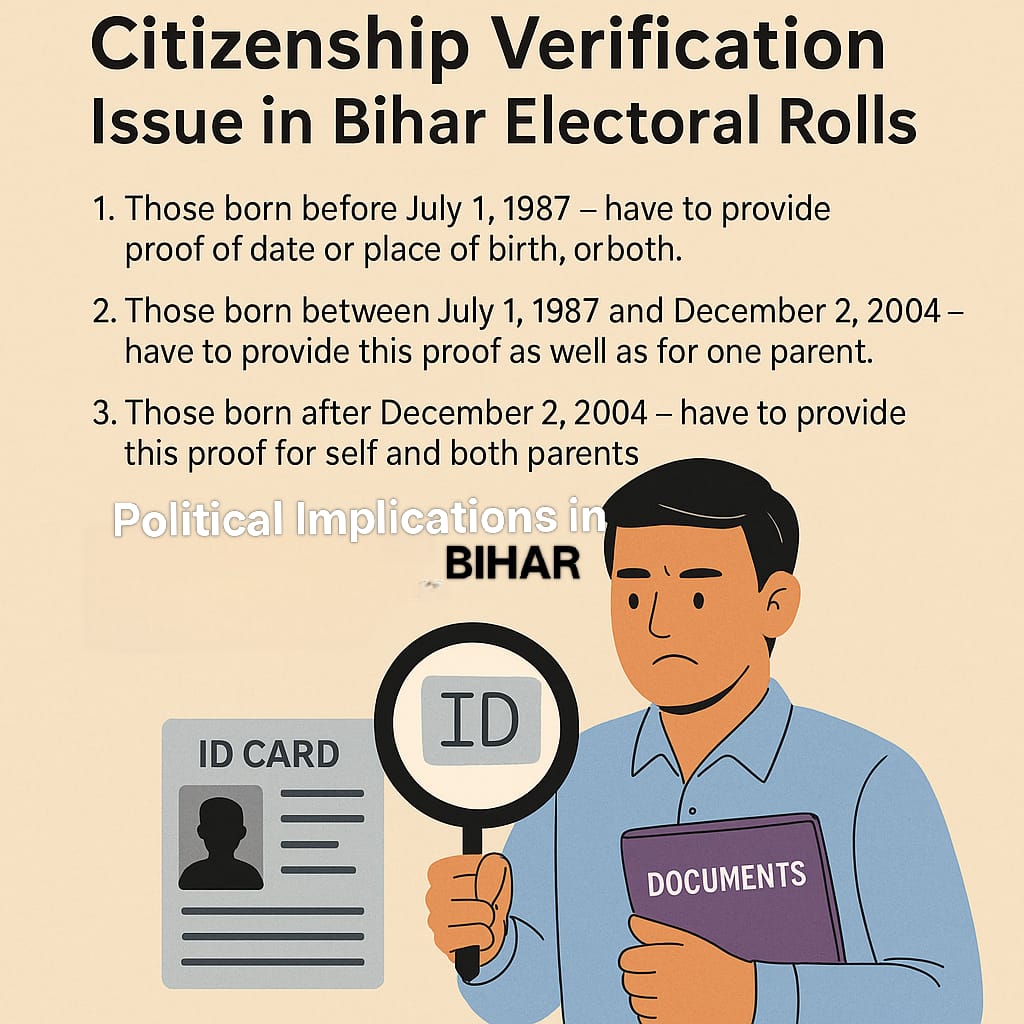Bihar’s Voter Registration Under Scrutiny: Citizens Required to Prove Citizenship with New Rules
In a contentious turn of events in Bihar, the ongoing special voter revision campaign has sparked a political storm as citizens are now mandated to provide extra documentation for citizenship verification. This change primarily affects individuals who were absent from the electoral rolls of 2003. The new rules have drawn sharp criticism from opposition parties, who argue that the process resembles an under-the-radar implementation of a National Register of Citizens (NRC) exercise, cloaked in bureaucracy without public debate or formal announcement.
According to the Election Commission of India (ECI), the revised voter registration process comes under the legal framework of the Citizenship Act, 1955. The ECI has classified voters into three distinct categories based on their date of birth, determining the necessary documents required to establish citizenship. The first category consists of those born prior to July 1, 1987, while the second encompasses individuals born between July 1, 1987, and December 2, 2004. The final category includes those born after December 2, 2004. This initiative, a significant shift from the previous voter list revision process in 2003—which focused merely on correcting discrepancies—has raised eyebrows and concerns throughout the political landscape.
Who, What, Where, When, Why, and How of the New Regulations
The primary entity behind this initiative is the Election Commission of India, which aims to streamline the electoral registration process in Bihar, specifically targeting the disenfranchisement of voters who have been historically marginalized. The ECI’s new rules are particularly pertinent as they specify the kinds of documentation that individuals must present to verify their citizenship, adding layers of complexity to an already challenging process. As this situation unfolds in Bihar, voters are being asked to provide documentation to confirm their citizenship status, leading to widespread political backlash.
The new voter registration rules, which were announced in October 2023, are intended to create an updated electoral list that is reflective of the current demographic in Bihar. The requirement for additional documentation, however, has triggered accusations from the opposition that this is aimed at making it difficult for certain communities, including minorities and economically disadvantaged groups, to register to vote. Analysts predict that this could have serious implications for the upcoming Bihar Assembly elections, scheduled to take place in early 2024.
The mechanism by which these new regulations are enforced is intricate, as voters are required to submit proof of identity and residence to validate their citizenship. The types of documents accepted include government-issued identity cards, birth certificates, passports, educational certificates, and even caste certificates among others. This labyrinth of requirements requests not only self-verification but also verification of family members, which has caused consternation among citizens and critics alike.
Political Opposition and Concerns
The backdrop of this new initiative has led to significant unrest among opposition parties and civil society organizations. Critics have raised alarms, asserting that these new requirements are purposefully designed to disenfranchise vulnerable communities—particularly minorities, Dalits, migrants, and lower-income individuals. They argue that enforcing such documentation without public debate or legislative approval creates an unfair burden on ordinary citizens, particularly those from disadvantaged backgrounds.
The backlash has been swift. Prominent opposition leaders have demanded that the ECI either clarify the motives behind the rules or suspend the citizenship verification process entirely as the state gears up for elections. They fear that merging citizenship issues with the electoral process may encourage social unrest and exacerbate existing tensions in the state—a concern that has historical precedent, referencing the tumult experienced during Assam’s NRC exercise when millions struggled to prove their citizenship.
As per the report by The Hindu, the opposition coalition comprising various influential parties in Bihar, including the Rashtriya Janata Dal (RJD) and the Congress Party, has called for immediate dialogue with the ECI. They argue that clarity is necessary to ensure that all eligible citizens can participate fully in the democratic process without fear of disenfranchisement.
Implications for Bihar’s Political Landscape
The political ramifications of this new rule cannot be overstated. With Bihar’s Assembly elections looming, analysts speculate that these changes may serve as a tactical maneuver aimed at dividing voter demographics. The implementation of citizenship verification could selectively suppress voter registration among communities that may not support the ruling party, thus reshaping the electoral landscape in favor of specific political interests.
Furthermore, the demand for transparency and the push for a halt to the documentation requirements during election season emphasize the urgent need for electoral reforms. Political commentators suggest that citizenship verification processes should be decoupled from the electoral machinery to protect the rights of voters and maintain democratic integrity.
In this context, the ECI faces a dual challenge: encouraging robust voter registration while simultaneously addressing the legitimate concerns of opposition parties and the electorate at large. The need for balanced governance is crucial to ensuring that voting rights are preserved for all citizens, particularly in a state as diverse and complex as Bihar.
For further information on the political dynamics in Bihar and how they may impact upcoming elections, visit[this detailed analysis on electoral reforms](https://www.ndtv.com) and[voter registration challenges](https://www.hindustantimes.com).
As Bihar navigates this contentious landscape of citizenship verification, it remains imperative that all stakeholders engage in constructive discourse to ensure that democracy thrives in the state. The underlying theme remains clear: citizens’ rights to vote must not be compromised through cumbersome processes that risk disenfranchising vulnerable segments of the population.
DISCLAIMER
We have taken every measure to ensure that the information in this article and on our social media platforms is accurate, verified, and obtained from reliable sources. For feedback or complaints, please contact us at info@hamslive.com.


